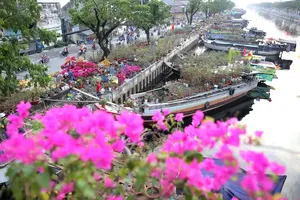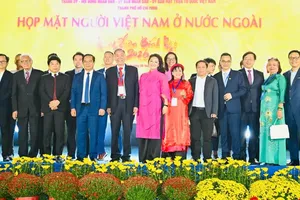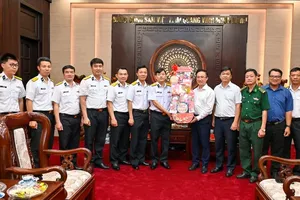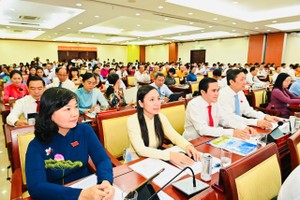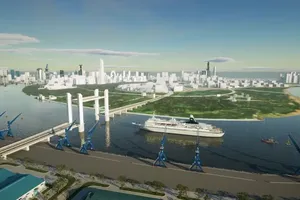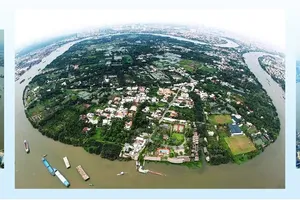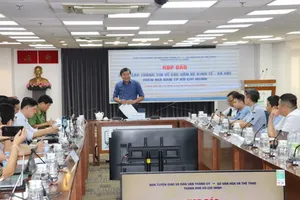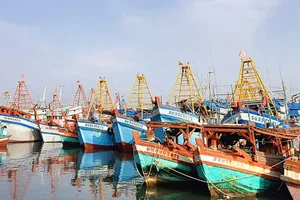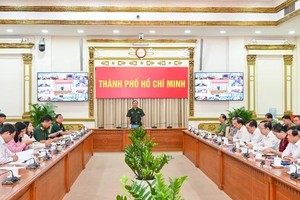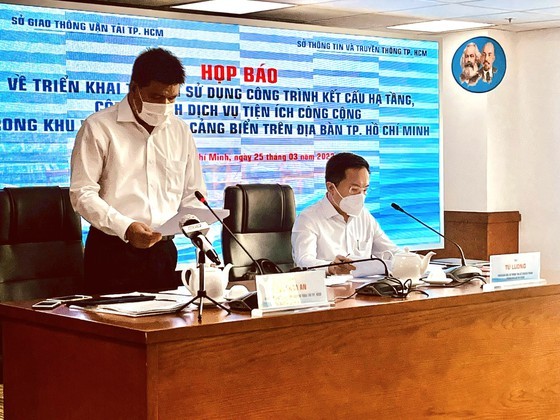 At the press brief (Photo: SGGP)
At the press brief (Photo: SGGP)
This moves aims to generate investment income, upgrade traffic infrastructure and maintain service works connecting seaports.
On the afternoon of March 25, the Department of Transport and the Department of Information and Communications of Ho Chi Minh City held a press conference on the implementation of the collection of fees for the use of infrastructure works using public services in the seaport border gate area in the southern metropolis.
At the press briefing, the two departments announced seaport fee collection will be implemented from April 1 as per the municipal People's Council’s Resolution No. 10/2020/NQ-HDND for re-investment as well as upgrade of traffic infrastructure and maintenance of service works connecting seaports.
Speaking at the meeting, Mr. Bui Hoa An, Deputy Director of Ho Chi Minh City Department of Transport said that Ho Chi Minh City has a plan to collect seaport fees from July 1, 2021. However, due to the impact of the Covid-19 pandemic, the toll collection plan was postponed to October 1, 2021, and then to April 1, 2022.
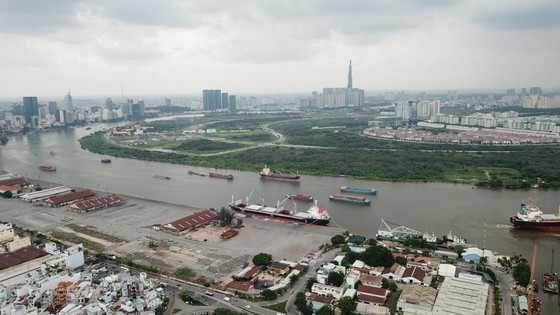 Khanh Hoi seaport (Photo: SGGP)
Khanh Hoi seaport (Photo: SGGP)
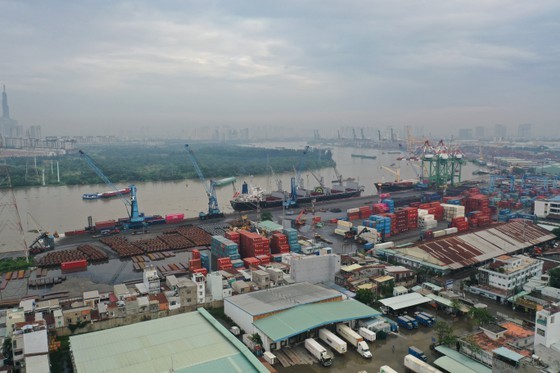 Tan Thuan seaport (Photo: SGGP)
Tan Thuan seaport (Photo: SGGP)
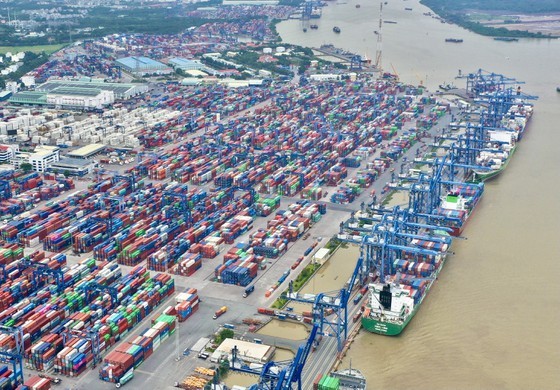 Cat Lai seaport (Photo: SGGP)
Cat Lai seaport (Photo: SGGP)
The postponement of the time of toll collection with the amount of VND2,205 billion (US$97.29 million) is considered as a support for production, business, and import-export enterprises to overcome difficulties caused by the Covid-19 pandemic.
According to Mr. Hoa An, from February 16, 2022, to the end of March 15, 2022, the People's Committee of Ho Chi Minh City assigned the city Inland Waterway Port Authority to coordinate with the city Customs Department and seaport enterprises in the border gate area to implement trial operation of the port fee collection system.
He added that the trial without collecting fee aims to facilitate concerned agencies, units, organizations and individuals' early access to the toll collection system before its official operation on April 1.
Ho Chi Minh City puts the interests of businesses first. All factors are considered, including toll collection time and toll rates. All collected fees will be poured into investment in the seaport border gate area, providing long-term support for businesses, but not the immediate", Mr. Bui Hoa An emphasized.
According to Mr. Nguyen Ngoc Tuan, Director of the Ho Chi Minh City Inland Waterway Port Authority, the fees for using seaport infrastructure in Ho Chi Minh City are as follows. The group of goods temporarily imported for re-export, goods stored in bonded warehouses, goods in transit, goods transshipped from border to border, shall be charged VND50,000 a ton for liquid and bulk cargo not packed in containers and VND2.2 million for a 20ft container and VND4.4 million for a 40ft container.
For imported goods and exported goods whose customs declarations are opened outside Ho Chi Minh City, the rate of VND500,000 will be applied for a 20ft container, VND1 million for a 40ft container and VND30,000 a ton for liquid and bulk cargo not packed in containers.
For imported and exported goods, the declaration is opened in Ho Chi Minh City, the charge rate is VND15,000 a ton for liquid goods, bulk goods not packed in containers, and VND250,000 for a 20ft container, and VND500,000 for a 40ft container.
Particularly for imported goods directly serving national security, social security, and for overcoming consequences of natural disasters, disasters, epidemics are exempt from fee collection.
The HCMC Department of Transport said that projects connecting traffic infrastructure in the seaport area have a total investment of VND93,247 billion (US$4.1 billion) in the 2020-2030 period. It is estimated that the fee collection revenue on the entire seaports citywide is about VND3,000 billion per year. According to the Department’s calculation, about VND16,000 billion will be collected from now to 2025.
It is very important to have additional revenue from the seaport border gate. Mr. Bui Hoa An said that in fact, the revenue only accounts for about 17 percent of the total estimated cost of construction of traffic works, but in the context of the city's budget, there are many difficulties as it is now, the revenue contributes to reducing the burden on the city's budget.
The money collected from now to 2025 will be used on promoting the construction of traffic works connecting seaports.
Specifically, the city will spend the amount to expand Nguyen Thi Dinh Street, My Thuy intersection; complete ring road 2 from Phu Huu bridge to Go Dua intersection – a part of the National Highway 1; widen Vo Chi Cong Street and Nguyen Duy Trinh Street.
Moreover, the amount will be used for the construction of D7 road from road No.990 to Vo Chi Cong Street, construction of the Nguyen Van Linh - Nguyen Huu Tho intersection, and Thu Thiem 4 bridge in the form of public-private partnership, building Cat Lai - Phu Huu inter-port road, widening Nguyen Huu Tho Street from Nguyen Van Linh Street to Ba Chiem bridge in accordance with the plan.
Besides, the fee will be used to dredge and maintain Soai Rap channel, inland waterways, invest in the construction of inland ports and inland waterway ports to increase the capacity of cargo transport by waterway for reducing pressure on road traffic.
Assessing the current fee, the Department of Transport said that the seaport fee applied in Ho Chi Minh City is only 50 percent of that in the Northern City of Hai Phong.


